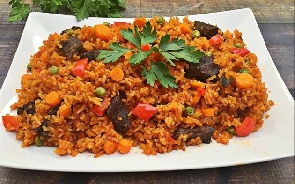Carol Mabinty Khanu, a 26-year-old chef representing Sierra Leone, won the 2019 Jollof Competition in Washington, District of Columbia (DC).
Liberia came second, Nigeria was third and Ghana took the fourth position in the competition which is in its third year.
The programme which took place on July 6, 2019, at the Pupils Heart at the College of the District of Columbia (UDC) saw hundreds of persons in attendance.
Carol is from Masimera Chiefdom in Northern Sierra Leone. The new DC Jollof Queen fell in love with cooking at a really tender age.
In an interview with TheAfricanDream.net, Ishmael Osekre, the founder of Afropolitan Insights, creators of the festival said: “We are incredibly joyful for Carol and we desire her and all other winners and individuals the greatest on their individual journeys, they all immensely contributed to the achievements tale that this festival has developed into given that we began in 2017.“
Nigeria won the first-ever Jollof competition in Washington DC in 2017.
In recent times, social media has also become a popular tool for people to share pictures, and opinions over who serves the dish the best.
The biggest debate has been between Ghana and Nigeria as each country claims supremacy over the other in the preparation of the dish.
Different Jollof Competitions have been held across the world, with famous critics from all over the world coming together to taste, examine the differences, and give their overall judgments on either form of the dish.
Jollof rice is one of the most common dishes in Western Africa, consumed throughout the regions of Nigeria, Senegal, Ghana, Sierra Leone, Gambia, Togo, Liberia, Niger, Mali, Ivory Coast and Cameroon.
In 2017, the Ghana Tourism Authority launched the maiden edition of the Jollof Rice Festival as part of the ‘See Ghana, Eat Ghana, Wear Ghana, Feel Ghana’ campaign.
This was to promote domestic Tourism, Ghanaian culture and heritage.
Entertainment of Saturday, 20 July 2019
Source: classfmonline.com













